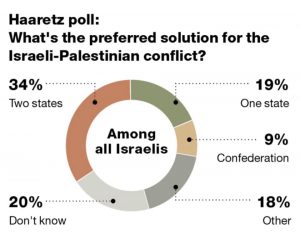Israelis and Palestinians are two of the most surveyed peoples on earth. Other than numerous non-profit organizations internally dedicated to documenting results, most international polling institutions heavily poll these populations.
Some do it to find trends or reactions to political developments while others use it to prove a political point. Of course, one can deconstruct from a sociological perspective how questions are framed and dismiss results as they see fit. This piece does not intend to do that.
Instead, this short article seeks to better understand result polling. Haaretz recently ran a poll targeting Jewish Israeli attitudes towards different solutions to the Israeli-Palestinian conflict. Needless to say it follows similar trends that were first found a few years back, in that Israelis are less and less favoring a two state solution, with approximately 34% supporting the policy.

Upon posting these findings, I was asked what I think the results of a similar poll would be on the Palestinian side (specifically in the West Bank and Gaza). I personally track this and two other main polling institutions (none Israeli as Israeli polling of Palestinians has been found to be partially unreliable).
Similar to Israelis, Palestinians for the past 3-5 years have seen a big reduction in support for the two state solution. During the height of the Oslo Accords, Palestinian support hovered between 75-90% depending on developments. Today that number is around 41% (averaging out the three polls). Approximately 24% support a one state solution, 31% have “no strong opinion,” and 5% support other.
What causes support for one of these categories? Well, the “no strong opinion” I like to rename the “whatever gets us our rights” outlook, where Palestinians are willing to support any solution that leads to human rights, equality, and dignity. This is a non-ideological group in the sense they are not stuck in a solution paradigm. They were the group that largely bought into the Oslo accords despite not having any personal or economic stake in it. Now, after 25 years of destructive Oslo-oriented policies, they are more and more willing to accept alternative solutions.
Support for two states among Palestinians can be broken down into three main categories.
First is what I call the investment block. These include two types of people, those who are economically invested in the two state solution and those who are politically invested. For the former, it is easy to understand this group and how they come to their conclusion. Over 30% of employed Palestinians work for the Palestinian Authority and over 50% are dependent on a PA paycheck. This also includes businessmen who benefit from trade relations with Israelis. The latter subset are people who have worked tirelessly from the 1950s to the 1990s to gain recognition of Palestinian rights and are weary of starting a whole new process, which is understandable.
The second major group of two state supporters are a mixture of those who believe it is the only solution possible and acceptable to ruling class Israelis and the international community, and at the same time view it as the one which would antagonize the broader Israeli society most. Palestinians are not ignorant to the fact that the West Bank represents the cradle of Jewish civilization, hence this group views securing Palestinian sovereignty in this area as a symbolic victory after many decades of repression, occupation, displacement, and dispossession.
The third group of two staters I affectionately call the “Abeer” argument. Abeer is a dear friend of mine who, other than being incredibly educated and philosophically minded, is surprisingly a two stater despite most of the Palestinian educated class typically being one staters. One day while discussing this issue, and having assumed for years she supported one state, I asked and she surprised me with an answer heard pretty frequently. She said, “Listen, I get the thinking behind one state but for me I just don’t want it. Not today. I want to go to a Palestinian border. I want to hand my Palestinian passport to a Palestinian border guard. I want him to speak to me in Palestinian Arabic. I want him to then stamp my Palestinian passport with a Palestinian exit visa and say in Arabic ‘Have a nice trip’.”
This is not an uncommon sentiment and even those aforementioned groups will reiterate this point.
Palestinian support for one state, on the other hand, is the longest standing and most ideological position. Similar to those Israelis who support it, there is a spectrum of what one state looks like but, unlike the Israeli side, there is more uniformity of basic ideas such as “one man, one vote” and universalist principles of equality and justice for all, not one specific group.
This is partially caused by a realization that to get Israeli Jews and the international community on board, the basis of the state must be one of universalist principals. Many also see a partition of the land as a ticking time bomb as it would be economically unviable and controlled by an illiberal dictatorship anathema to most Palestinians.
I write this article not to say “Wow, I’m so surprised by these new findings.” In fact, the opposite is true. Israeli and Palestinian societies are going through a shift where after 25 years of investment and buying into a system called the Oslo process that yielded mostly negative results, people are looking for new alternatives.
My only point of skepticism is based around the question of how bridgeable the Palestinian and Israeli concepts of one state are.





